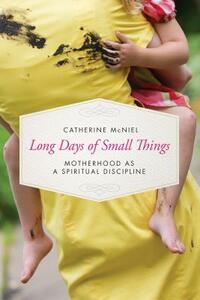Take a photo of a barcode or cover
On page sixty-six of Long Days of Small Things: Motherhood as a Spiritual Discipline, Catherine McNeil asks this profound question: “Is it possible that, in the wonder of creation and Incarnation and the life-giving routines we are always acting out, we pass through sacraments—are covered in, coated in, up to our elbows in sacraments—every day?” And this is the question she explores throughout the book. Can the mundane moments of motherhood be made sacred? Here she shows us that, yes, even in the long days, God is there with us and what feels like our small offering is pleasing and acceptable in His sight.
In some ways, it didn't feel like this book was written for me. It uses a language for God that makes me squirm and expresses a faith that is a tad bit foreign from my own. There were things that didn't echo with my own heart but there was so much that did.
I'm a first-time mom with a six month old baby. I've struggled to find time to read this book simply because she's become the active feeder and it's hard to hold an actual book (rather than my Kindle) during feedings and so it took me a whole lot longer than I thought it should to savor these words.
Catherine McNiel invites moms just like me to slow down and pay attention. At times, this seems repetitive. It feels like the practices she's offering are exactly the same and sometimes like it's just too much to hold in your head while changing another dirty diaper, nursing, driving to the grocery store, tackling the clutter on the counters (I loved this one), nursing and so many other moments where we could pause and pay attention to what God is doing in this moment. I loved this reminder just to notice the many ways that God is incarnate. God is tending the holy with us. It is truly something to celebrate.
I'm so grateful for this nudge to my spirit to practice motherhood in the same way I've tried to practice my faith and my ministry.
I'm a first-time mom with a six month old baby. I've struggled to find time to read this book simply because she's become the active feeder and it's hard to hold an actual book (rather than my Kindle) during feedings and so it took me a whole lot longer than I thought it should to savor these words.
Catherine McNiel invites moms just like me to slow down and pay attention. At times, this seems repetitive. It feels like the practices she's offering are exactly the same and sometimes like it's just too much to hold in your head while changing another dirty diaper, nursing, driving to the grocery store, tackling the clutter on the counters (I loved this one), nursing and so many other moments where we could pause and pay attention to what God is doing in this moment. I loved this reminder just to notice the many ways that God is incarnate. God is tending the holy with us. It is truly something to celebrate.
I'm so grateful for this nudge to my spirit to practice motherhood in the same way I've tried to practice my faith and my ministry.
Does anyone become a mother fully prepared for the chaos of motherhood or for the incredible responsibility in brings? I think I knew that there is not much in the early years of motherhood (or ever?) that sound like “quiet” or “time” or “uninterrupted”. But after nights of little to no sleep, work deadlines that don’t care if you are tired or how much laundry you need to fold, and days of never ending busy, it’s hard to figure out how to practically refill your own heart and soul so you can adequately mother and train your children. I read the pages of this book with tears in my eyes because it really did hit so close to home. It was so practical, and simple, and filled with hope that even though “quiet time” might not look the same as it did before children, it is possible to find a way to reconnect, be refreshed, and refocus on the important things.
It was a refreshing perspective on the little years when you know they go quickly, but they don’t really feel like it when you’re in the middle of sleepless days and sickness and perpetual messes. Definitely a book I will share with other mamas!
It was a refreshing perspective on the little years when you know they go quickly, but they don’t really feel like it when you’re in the middle of sleepless days and sickness and perpetual messes. Definitely a book I will share with other mamas!
Such a challenge yet helpful book in this stage of motherhood. I loved reflecting on the different tools provided throughout the book and the chapter on perseverance and the explanation was so so good. I’d definitely recommend this to other mums.
I read the introduction and a sob caught in my throat. I think this will be a profoundly affecting read for me in this season of my life.
This book reminded me to slow down and experience everything I do as a mother intentionally. I am changed for the better after reading this. Highly recommend.
This book reminded me to slow down and experience everything I do as a mother intentionally. I am changed for the better after reading this. Highly recommend.
I profoundly agree with the title, and the grounding concept of this book, that even in the drudgery of motherhood we find the paths of spiritual connection to God and spiritual renewal. She's honest about the struggles of parenting, and writes powerfully enough. Yet...I was left underwhelmed. The reminders to engage, to contemplate, to find spiritual practices in the routines of life are useful yet exactly what I would expect.
And also, more worryingly, the perspective here was incredibly heteronormative and implicitly white. There were moments that acknowledged other paths to motherhood, such as adoption, but there was nary a glimmer of LGBTQ parenting or partnerships. In a book that rightly emphasizes the connection between the spiritual and the physical (as she writes, "what happens to our bodies matters"), then why are the bodies here only certain kinds of bodies? As a small example, she cites the extraordinary Biblical model of Hagar, who has the audacity to name God: "You are the God who sees me." Yet she doesn't mention that Hagar is an Egyptian woman, presumably dark-skinned, who womanist scholars such as Wilda Gafney have taken as a powerful instance of God's care for the enslaved, an archetype of the African diaspora and a Muslim matriarch no less! This is what's missing in this book--a sense of the wider world and range of experiences beyond an American white lady's.
Of course, this is her particular story, but she's also making an important claim for women in general, a corrective against patriarchal assumptions about what "spiritual discipline" looks like. So all the more reason to open the door even wider, to imagine that spiritual discipline might come in the guise of different motherhoods than her own.
(Out of curiosity, I checked if she ever uses the words "patriarchy" or "patriarchal." She does not. So, while there is certainly an empowering sense of inscribing motherhood with spiritual value, she often does so while re-inscribing the very traditional roles assigned to maleness and femaleness.)
And also, more worryingly, the perspective here was incredibly heteronormative and implicitly white. There were moments that acknowledged other paths to motherhood, such as adoption, but there was nary a glimmer of LGBTQ parenting or partnerships. In a book that rightly emphasizes the connection between the spiritual and the physical (as she writes, "what happens to our bodies matters"), then why are the bodies here only certain kinds of bodies? As a small example, she cites the extraordinary Biblical model of Hagar, who has the audacity to name God: "You are the God who sees me." Yet she doesn't mention that Hagar is an Egyptian woman, presumably dark-skinned, who womanist scholars such as Wilda Gafney have taken as a powerful instance of God's care for the enslaved, an archetype of the African diaspora and a Muslim matriarch no less! This is what's missing in this book--a sense of the wider world and range of experiences beyond an American white lady's.
Of course, this is her particular story, but she's also making an important claim for women in general, a corrective against patriarchal assumptions about what "spiritual discipline" looks like. So all the more reason to open the door even wider, to imagine that spiritual discipline might come in the guise of different motherhoods than her own.
(Out of curiosity, I checked if she ever uses the words "patriarchy" or "patriarchal." She does not. So, while there is certainly an empowering sense of inscribing motherhood with spiritual value, she often does so while re-inscribing the very traditional roles assigned to maleness and femaleness.)
This book was not what I wanted it to be; I felt like it was mostly paraphrasing bible passages rather than actual reflections on motherhood.
Honestly, at first, I approached this book with the thought - oh, more spiritual practices I don’t have time for as a busy mom. Another book to tell me what I should be doing and I’ll try for a little bit but then just end up feeling guilty I am not doing better at it. In just the first few pages I knew this wasn’t the “do more” mom book I had been expecting. It was the how-to practice God’s presence in the midst of the noise of motherhood book I never thought anyone would write. It was the Practice of the Presence of God for 21st-century women. It was more than soul-inspiring to me. It was life-giving. I highly recommend this book to any mom, especially the one who wants to find God in everyday life. This book will be like a friend guiding you there.
funny
hopeful
inspiring
lighthearted
reflective
medium-paced
It took me almost a year to make my way through this but not because it wasn't incredible. I was deeply impacted by each chapter and took my time digesting. I'm moving forward in my motherhood buoyed up and encouraged in the eternal value of the mundane.







